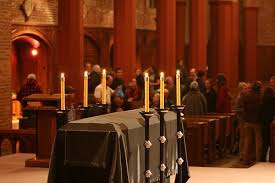My mother is recently deceased. My siblings want just a Mass said for our recently deceased mother. Is there a Mass for the Deceased other than a funeral?
-
It's a "funeral" if a body is present. The "Mass for the Dead"/"Mass for the deceased" is the intention or the particular prayers.– equesCommented Dec 5, 2016 at 18:40
-
1My condolences for your loss. In Catholic practice, a funeral should ordinarily be done (and it should also be done if your mother wished it). Additional Masses for the dead are often requested afterwards (on anniversaries, etc)– equesCommented Dec 5, 2016 at 18:43
-
The faithful may request a Mass to be said for the intentions of any deceased member of the Church. We may also request, if the priest is willing, to have that intention within a Requiem Mass offered up for someone too.– Ken Graham ♦Commented Dec 6, 2016 at 13:04
2 Answers
Yes, a Requiem Mass (Missa pro defunctis) can be said for the soul of a deceased person, and Requiem Masses needn't be accompanied by a funeral/burial.
Sometimes, Requiem Masses are said with a catafalque, which is something that looks like a coffin, but isn't; catafalques are to remind the faithful of the deceased person:

-
Particularly like the addition of the picture. A more concise answer than mine. Commented Dec 5, 2016 at 17:52
A Mass that includes your mother via Intentions for the Mass may fit your needs.
One way to remember your mother in a Mass is to contact the local parish, or the parish where she passed away, and make a request that the intentions of the Mass include her by name. (Anecdote: we have done this a number of times in the past four years since the death of my father-in-law, in his home parish, most recently on the day before Thanksgiving this year.) You could also ask to have a private Mass for, celebrated with your family, but that requires coordination with a priest.
For the Intentions of this Mass ...
The practice of praying for various individuals in the faith community is supported by a requirement from Canon Law.
Whenever a priest celebrates Mass, he has at least two intentions. The first intention is to celebrate the Mass according to what the Church does. The second is to apply the grace of that Mass towards a specific need, whether it be a person(s), living or dead, baptized or not, or a special need. Every parish pastor is required, by Canon Law, to offer at least one Mass on Sunday for the needs and intentions of his parishioners (Can. 534 §1).
Based on our family experience, you should contact your mother's parish, or your local parish, and ask to have her included in the intentions of a Mass that you will attend.
Can. 534 §1. After a pastor has taken possession of his parish, he is obliged to apply a Mass for the people entrusted to him on each Sunday and holy day of obligation in his diocese. If he is legitimately impeded from this celebration, however, he is to apply it on the same days through another or on other days himself.
§2. A pastor who has the care of several parishes is bound to apply only one Mass for the entire people entrusted to him on the days mentioned in §1.
§3. A pastor who has not satisfied the obligation mentioned in §§1 and 2 is to apply as soon as possible as many Masses for the people as he has omitted
-
2A particular Mass has one principal intention for which the priest offers it, which is not the same (or even required to be included) in the Universal Prayer/Prayers of the Faithful– equesCommented Dec 5, 2016 at 18:42
-
1The actual intention (required by Canon Law, etc) doesn't have to be verbally announced. The priest must specifically mentally intend it at least certain parts in the Eucharistic prayer; it's similar to how you can pray a Rosary for an intention without having to audibly announce it. A parish also must keep records of Mass intentions that have been requested and when they are actually made– equesCommented Dec 5, 2016 at 19:38
-
1that can be customary in various churches, but it's not actually required. Other places print the intention in the bulletin, etc (also not required)– equesCommented Dec 5, 2016 at 19:44
-
@eques I deleted some of the bits that are customary at our parish, per your points. I had assumed that this was standard form, but it will vary. Commented Dec 6, 2016 at 14:06
